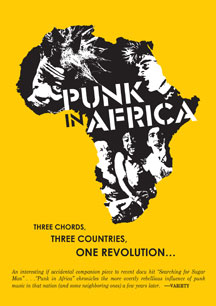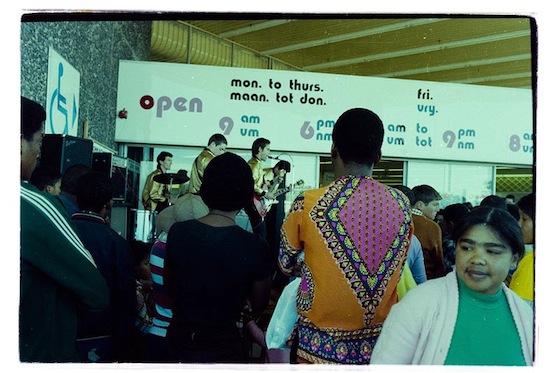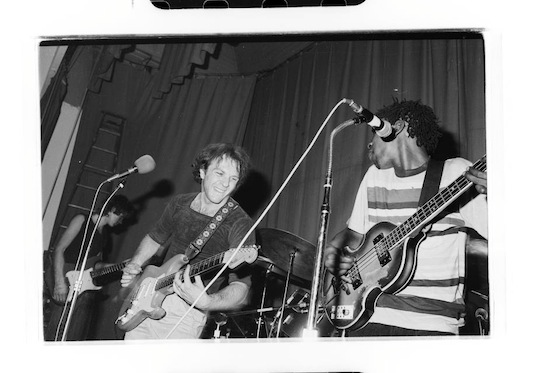 The concept of Punk In Africa (out now from MVD Visual) is amazing – underground bands, in the time of apartheid, integrating racially and playing music that speaks truth. And, in truth, a movie that told the story of those bands playing against a background of racism and the gradual change from the ’70s to the Sun City movement of the ’80s to Nelson Mandela being freed from prison would be amazing.
The concept of Punk In Africa (out now from MVD Visual) is amazing – underground bands, in the time of apartheid, integrating racially and playing music that speaks truth. And, in truth, a movie that told the story of those bands playing against a background of racism and the gradual change from the ’70s to the Sun City movement of the ’80s to Nelson Mandela being freed from prison would be amazing.
Punk In Africa is not that movie. Frankly, after spending a couple of days with it, I’m still not quite sure what movie Punk In Africa is. First of all, it’s not really presented in much context beyond what’s on the back of the DVD case. The movie just … starts. Aside from a brief mention of Black Sabbath playing, there’s no context from where this music developed.
Not given any sort of solid foundation from which you can begin, the film continues in fits and starts, without much of a narrative. The people speaking in Punk In Africa are all telling a series of individual stories which occasionally interconnect, but you’re not really being presented with a larger thread which develops over time.
 Thankfully, the music’s rather good. You get to hear quite a bit of it as it plays over grainy montages of VHS footage and fliers of long-ago shows. Additionally, the bonus features include live performances from all of the bands interviewed in the film. The sound and video quality vary, but there’s a nice selection of genres and talent levels, giving a solid snapshot of what “punk In Africa” means as a descriptor.
Thankfully, the music’s rather good. You get to hear quite a bit of it as it plays over grainy montages of VHS footage and fliers of long-ago shows. Additionally, the bonus features include live performances from all of the bands interviewed in the film. The sound and video quality vary, but there’s a nice selection of genres and talent levels, giving a solid snapshot of what “punk In Africa” means as a descriptor.
As far as the bands themselves go – again, the lack of narrative and interconnecting story fails the film. Each band is essentially telling their own story, and setting up where they came from, but unless one band mentions another, there’s no sense of how each exists in a bigger picture. It’s also not helped by the band members giving tours of where things once were, which is essentially late middle-aged men standing in front of locked gates and saying, “We played here lots.”
When you contrast this with the likes of touring the crumbling remains of Detroit’s Grande Ballroom in the MC5 documentary A True Testimonial, it just seems like padding. Again – no context, since you don’t even know what it looked like beforehand. Add in the fact that it’s organuized in such a way as to where you’re not quite certain as to what band’s being discussed when, and you’re left with a nearly-hopeless muddle.
 Surprisingly, it’s when the film abruptly switches to the post-1994 return of Nelson Mandela, and speaks with bands currently extant that you really get a solid idea of how things work. The Rudimentals and Evicted explain how their music reflects political upheaval quite well. It’s especially evident as the Rudimentals’ Teboho Madza discusses Zimbabwe’s issues, or when Evicted’s Theo Rohde talks about being part of the first generation of children with black and white parents.
Surprisingly, it’s when the film abruptly switches to the post-1994 return of Nelson Mandela, and speaks with bands currently extant that you really get a solid idea of how things work. The Rudimentals and Evicted explain how their music reflects political upheaval quite well. It’s especially evident as the Rudimentals’ Teboho Madza discusses Zimbabwe’s issues, or when Evicted’s Theo Rohde talks about being part of the first generation of children with black and white parents.
If you’re willing to sort through a lot of dross, you’ll have a brief bit of enlightenment during Punk in Africa, but for anyone with an eye to seeing a story unfold on screen, it’s a big disappointment.





Comments on this entry are closed.